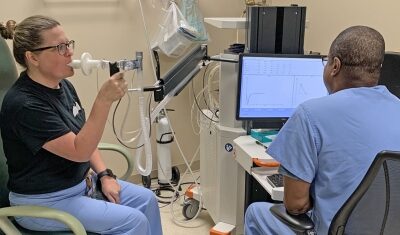In the United States, Black men are at highest risk for being diagnosed with and dying from prostate cancer.
Review Authors Urge More Genetic Testing of BRCA for Male Cancer Patients
Even though half of all carriers of inherited cancer-predisposing variants in BRCA1 and BRCA2 are male, the implications for their health tend to be under-recognized compared to females, according to a new study.
Another Reason to Reduce PPI Use? Usage Linked to Susceptibility for Respiratory Infections
One of the most commonly used medication classes worldwide, proton pump inhibitors (PPIs) are effective for treating acid-related stomach disorders, such as ulcers, heartburn or acid reflux.
Prescription Medications Affect Survival Rates in Metastatic Prostate Cancer
How do prescription medications affect overall survival in metastatic hormone-sensitive prostate cancer?
VA EHR Rollout at Lovell Federal Healthcare Center Better Than Previous Sites, But Legislators Say Some Issues Persist
About six months ago, the James A. Lovell Federal Healthcare Center became the sixth VA site to switch to the Oracle-Cerner electronic health record (EHR).
Hepatocellular Carcinoma Screening Associated With Improved Survival in Patients Cured of HCV Infection
Hepatitis C virus (HCV) is the most common blood-borne pathogen in the United States, with HCV-related cirrhosis being the leading cause of primary liver cancer, or hepatocellular carcinoma (HCC).
Study: Propofol Use Should Be Minimized in Children With ALL
A study involving military researchers has raised concerns about the use of certain types of anesthesia in children with acute lymphocytic leukemia (ALL)
Circumstances Linked to Bleeding Risk With Chronic Liver Disease Diagnosis
A recent study looked at risk factors for non-variceal bleeding within the first year after diagnosis of chronic liver disease in veterans.
Multiple Myeloma Patients Have Longer Survival With Military Healthcare
MHS beneficiaries with multiple myeloma (MM) had improved overall survival compared to MM patients from the U.S. general population, according to a new report.
Gastrointestinal Symptoms Frequently Diagnosed in Deployed Gulf War Veterans
Deployed Gulf War veterans frequently developed several gastrointestinal symptoms, including irritable bowel syndrome, dyspepsia, diarrhea, bloating and constipation, and those often persisted long after returning home, according to a new study.
Use of Non-therapeutic Laparotomy Decreased in Recent Wars but Remain Essential Battlefield Trauma-Care Tool
As combat casualty care improved over time during the wars in Iraq and Afghanistan, the use of nontherapeutic laparotomy (NTL) decreased.
Study: Eating Processed, Red Meat Raises the Risk of Type 2 Diabetes
Consuming meat, especially processed and red meat, is a risk factor for the development of type 2 diabetes, according to a new study involving VA researchers.
Misdiagnosis of Community-Acquired Pneumonia Occurs More Than Half the Time at VA Hospitals
Pneumonia diagnoses change more often than not at VA hospitals, either because a veteran initially thought to have the infection is diagnosed with something else or because the community-acquired pneumonia diagnosis was missed when the patient entered the hospital.
Persian Gulf War Service Linked to High Rates of Myeloproliferative Neoplasms
A study of almost a half-million veterans has found for the first time a link between environmental exposures during military service and the development of myeloproliferative neoplasms (MPNs).
Removing Race From Lung-Function Equations Shifts Disease Classifications
In 2023, the American Thoracic Society recommended race-neutral interpretation of lung function and requested the investigation of “consequences for the yet-unquantified number of individuals with results near decision-making thresholds.”
Anti-TNF Agents Associated With Kidney Function Decline in IBD Patients
The introduction of biologic therapies, such as antitumor necrosis factor (TNF) agents, has revolutionized the management of inflammatory bowel disease (IBD)—a group of diseases characterized by chronic inflammation of the gastrointestinal tract.
Essien Pushes Pharmacoequity in VA Healthcare to Combat Disparities
A general internist and health services researcher with the Center for the Study of Healthcare Innovation, Implementation, and Policy (CSHIIP) at the Greater Los Angeles Healthcare System, Utibe Essien, MD, MPH, has devoted his career to defining and then breaking down the systemic problems that lead to healthcare inequity.
Leadership Is Service, Not Position
It has been a particularly challenging few weeks for Team Buckenmaier. We recently pulled our floating home (a Lagoon 42 catamaran) for much-needed routine maintenance and bottom work at a local yacht yard. Our 3,000-plus miles in the Atlantic had taken their toll on the boat and its systems.
Cytomegalovirus Examined in Breast Cancer Tumor Development
Cytomegalovirus (CMV), a herpesvirus that leads to lifelong infection, appears to play some role in breast cancer, according to a new study.
Why Do Surprising Distant Metastases Occur in 10-30% of ‘Cured’ Breast Cancer
PITTSBURGH — In most cases of breast cancer, no evidence of spread is found, the primary tumor is removed and the patient is as close to cured as possible, at that point. In 10% to 30% of cases in women, however, distant metastases recur after years to decades. “This...
New Efforts Seek to Reduce Treatment Time, Travel for Breast Cancer Patients
WASHINGTON — Earlier this year, the VA announced expansion of the "Close to Me" cancer program, with the understanding that access to medical centers providing specialty cancer care can be difficult for many veterans. The expansion will bring new cancer diagnosis,...
Legislators Question Continued Usefulness of VISN System at VA
The Veterans Integrated Service Networks (VISNs), which group VA’s facilities into 18 interconnected regions, has been a key part of the department’s structure since they were created in the late 1990s. Now, following a series of key oversight failures at VA facilities and years of watchdog agencies reporting frustrating inconsistencies from VISN to VISN, legislators are wondering if this structure is really the best way to oversee VA’s 172 hospitals nationwide.
VHA Closely Follows Clinical Guidelines on Gender-Affirming Hormone Therapy
When initiating gender-affirming hormone therapy (GAHT) at the VHA, clinicians achieved high overall concordance between current GAHT initiation practices and guidelines, particularly for feminizing GAHT, according to a recent study.
OIG: VISN Leaders Had No Awareness of Toxic Work Environment, Cardiac Surgery Delays at the Rocky Mountain Regional VAMC
At the Rocky Mountain Regional VAMC, a toxic work environment caused by a handful of facility leaders resulted in mass resignations by top clinical staff and the closure of its cardiothoracic surgery program, according to a report from the VA Office of the Inspector General (OIG).
Strong Links Found Between Obstructive Respiratory Disease in Veterans, Psychiatric Health Conditions
Veterans with obstructive respiratory disease should receive timely screening and treatment for comorbid psychiatric and medical conditions that frequently accompany the condition, according to a new study.
COVID-19 More Severe in Veterans With Chronic Lung Diseases
Veterans with chronic lung diseases, particularly idiopathic pulmonary fibrosis (IPF), other interstitial lung diseases (ILD) and chronic obstructive pulmonary disease (COPD), have an increased risk of experiencing more severe 30-day outcomes with COVID-19, according to a recent study.
Are PSA Values Reliable in Transgender Women to Detect Prostate Cancer?
In a VHA population, prostate-specific antigen (PSA) values in more than one-third of transgender women receiving estrogen were found to be undetectable, which indicates that PSA values in transgender women should be interpreted cautiously, according to a recent study.
Using Spironolactone to Treat HFpEG Reduced All-Caused Death
For veterans with heart failure with preserved ejection fraction (HFpEF), spironolactone use reduced all-cause death and demonstrated a favorable trend in reducing hospitalizations, according to a study of a real-world national cohort of patients with HFpEF.
VA Renews Oracle Contract Amid Intense Criticism of EHR Rollout
VA has renewed its contract with Oracle Health to support its electronic health record modernization project. The 11-month extension will place emphasis on not only improving the much-beleaguered EHR, but on holding Oracle accountable when goals are not met.
Novel Psychotherapy Targeting Unresolved Trauma Reduces Chronic Pain in Older Adults Better Than Traditional CBT
Chronic pain in older adults can be significantly reduced using a newly developed psychotherapy called emotional awareness and expression therapy (EAET), which confronts past trauma and stress-related emotions that can exacerbate pain symptoms, according to a new study.






